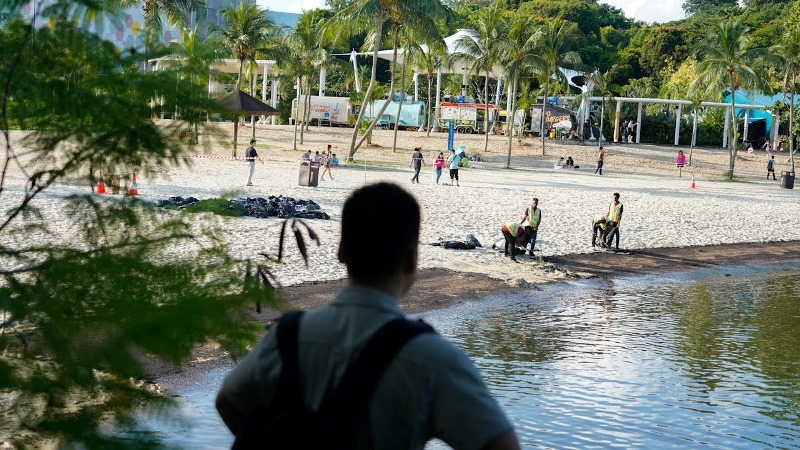- Tarique vows quick execution of Teesta Master Plan if elected |
- How Undecided voters May Decide the Election |
- Nearly one million security personnel to guard BD elections |
- Restoring trust in Allah, Caretaker Govt; good governance, employment, no-revenge BNP's key election pledges |
What is Singapore's oil spill telling us?

Oil from a tanker collision left white sandy shores on Singapores resort island of Sentosa tarred with a black slick. Image- Liang Lei - Eco-Business
Ecological crises can spark different psychological responses in people – anger, sadness, or even apathy.
Over the weekend, Singapore has been racing to clean up the oil slick coating its public beaches on the Southern coasts, after a tanker collision occured at a nearby port. When oil was first sighted on the city-state's coastline, many were shocked to also see a photograph of a kingfisher drenched in oil circulating online. In a WhatsApp group to track updates on the spill, people anxiously said they wanted to help with the cleanup effort. It is difficult to describe how one feels when seeing wildlife ensnared in an environmental disaster.
This week's lead story looks at what conservationists and marine scientists will be monitoring post-oil spill, to go beyond the incident's most visible effects – and to track how coastal mangroves, coral reefs and other wildlife have been impacted. Can the spill be remedied and who should be held liable? An investigation on the vessel collision is ongoing, as the uncomfortable reality of a calamity despoiling the coastline of one of the world's biggest refining hubs sinks in.
Experts we spoke to also say small island nations already face an existential threat from ship-source pollution – known as bilge dumping – which endangers our vulnerable marine ecosystems. Oil spills add to that.
https://www.eco-business.com/news/singapore-counts-costs-of-oil-spill-to-biodiversity-rich-waters-as-shore-cleanup-expands/?utm_medium=email&_hsenc=p2ANqtz--QOHlSiZVI21RINFXkzX9HwqK1QT4YJHsFzX7ngorBrc97uVHKyN4RtoK1b6mWJ1tVEKTskFIzR1acIcwKNo0JNI3aM2xQIHDZJgyYd9a9lf6L9h8&_hsmi=312220849&utm_content=312220849&utm_source=hs_email

